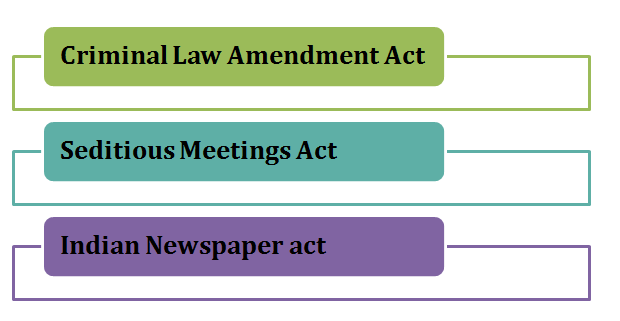

A very new class of Indian national leaders emerged at the very beginning of the 20th century. This class of leaders were different from the existing ones in their individual and unique thoughts. The main reason behind the emergence of extremists was several limitations of moderate leaders. Approaches of the moderate leaders toward the British ruler were found non-effective.
There are certain causes that lead the Indians to accept an aggressive approach against the British rulers.
The first reason was all moderate leaders’ failure in getting fruitful results from the existing British rulers.
Limitations of the moderate leaders in proposing the necessary requirement led the then-young leaders to take an aggressive approach (Tiwari, 2019).
In 1905, the decisions regarding the partition of Bengal influenced directly the emotions of Indians. This incident brings the true colour of the British in front of the common people.
Indians got angry because of Lord Carson's disdain regarding any Indian things. This is a huge cause of resentment among Indians.
Some leaders believed that moderate leaders’ main intention was to create an India in a westernised way.
At that specific time, the revival of national pride was concerning among all leaders.
Spiritual nationalism was growing at that time and this influenced the extremist leaders to take a step against British rule.
In 1903, the Delhi Durbar was held and the Indians had not recovered then from famine.
The external world’s political disruption and the emergence of war-like situations have also created a sense of change among extremist leaders.
Successful repulsion of Abyssinia in 1896 influences Indians leaders.
Some other national movements such as those of Turkey, Persia and Egypt have also motivated Indian leaders to take aggressive actions against the British.
The surat split was a great concern of that time in the Indian political field and in social changes as well. The main aspect of this incident was the emerging differences between extremists and moderates regarding the approaches toward the British. INC’s surat session in 1907 was the most important one in this regard. This meeting was proposed to be held in Nagpur.
A conflict between the moderates and the extremists was raised about the leaders. Bal Gangadhar Tilak or Lala Lajpat Rai was the choice of extremists whereas; the moderates' choice was Rash Behari Ghosh. There was a certain rule about the selection of the precedent. No president of INC can be from any home province. This aspect creates difficulties for Tilak, as his home province was Bombay. The resolution of swadeshi, national education and boycott movements were dropped by the moderates (Bhat, 2022). In the Surat session, Rash Behari Ghosh was selected as the president. Both these two different parties were enraged and the core intention of holding this meeting was fully destroyed.
The three most popular extremist leaders were together known as “Lal-Bal-Pal”. They were Lala Lajpat Rai, Bal Gangadhar Tilak and Bipin Chandra Pal. In Punjab, Bengal and Bombay, extremist approaches were carried on by these three rulers (Tiwari, 2019). There were some other leaders as well, namely VOC Pillai, A K Dutt, Aurobindo Ghosh and some more.
The goal of extremist leaders was to achieve swaraj. The extremist leaders integrally evolved a wider range of Indians. Each extremist leader possesses pride in Indian culture, history and own uniqueness. No such constitutional methods were adopted by these leaders in achieving theirs. All extremists believe in direct confrontation rather than persuasion. The almost-dead swadeshi movement regained and gathered the necessary momentum because of the active participation of extremists.
The then British government was angered by the approaches and direct attack of extremist leaders and therefore several laws were passed against them.

Seditious Meetings Act was possessed in 1907, Criminal Law Amendment Act in 1908 and the Indian Newspaper act are important as well. All these laws were introduced for resisting the emergence of extremists.
No such tough impact was found by such approaches and the main intention of the rebellion was getting faded. This is the reason; the extremists take an aggressive approach against the British Empire. Certain slogans by these leaders influence common Indian and raise their awareness regarding the demand for freedom. The Indians boycotted national education and British goods, which impacts the British in a high range. The extremist period helped in bringing a major reform in the Indian education system, and as a result, some of the National universities became free from British control.
The persuasive approach of moderate leaders was fully avoided by extremists. This different and aggressive nature of extremists creates a sense of serious concern among British rulers. In the history of Indian independence, extremist leaders possess immense significance, as they believed in sacrificing their own life at certain times to bring freedom to their motherland. These leaders that influence directly on the Indian cultural and social condition did not acknowledge the loyalty of the British Crown.
Q.1. Who had arranged some festivals for spreading the core message of boycotting and westernization of India?
Ans. Bal Gangadhar Tilak, one of the most promising extremists of INC had arranged Shivaji and Ganpati festivals. These two festivals were major steps toward social reforms and the entire Indian society was highly impacted by them.
Q.2. Which statement of Tilak is famous for understanding the range of extremists?
Ans. According to Tilak, no simpler and more generous step can make any impact on the British and Indian should be aware of their own rights. One of his famous statements is “Swaraj is my birthright and I shall have it.”
Q.3. What was the goal of extremist leaders?
Ans. The main aim of extremist leaders was to ensure that all Indians are self-reliant and enough aware of individual respect. The extremist leader’s approach was more radical than the moderates were.